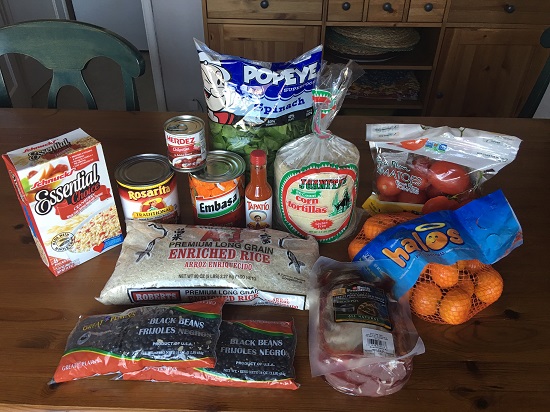Prep for the SNAP Challenge: Privilege Isn’t on the Shelf
May 9, 2017
We do not offer food. Here’s where you can find food.
No distribuimos alimentos. Encuentre comida gratis aquí.
我們不直接提供食物,但我們能幫助您找尋食物。

As I dove into the #SNAPchallenge, it was immediately clear how much my privilege will influence this experience. For starters, I drove my car to the Grocery Outlet in Richmond. Many people who are on SNAP (CalFresh in California) live in food deserts – areas where adequate food shopping is a mile or more away. Therefore, they are looking to get a ride or depend on public transportation, which can be unreliable and dramatically increase the time needed to just get groceries. In addition, my wife took our preschooler, and I only had to tend to our baby, who was miraculously calm. Other parents will not have these options at their disposal.
What’s more striking is that my choices were informed by the fact that this will be a short-term experience. I’m not looking forward to rationing my food, but at least I know there is an end in sight. That knowledge made it so much simpler to make a meal plan, knowing I can return to a balanced diet and complete meals in just a few days.
Still, unaccustomed to this level of budget constraint, I circled the store a few times, meticulous in my calculations of calorie count, serving sizes, and, of course, price. I can only imagine how hard the tallying would be if I were already hungry, stressed about the bus schedule, or trying to cajole unhappy children to behave. While the primary purchasing challenge was looking to achieve sufficient calories, creating a nutritionally adequate diet was the first thing that went out the window. I immediately focused on staples that would stave off hunger and then worked in the few produce items that I was able to afford on the $4.50 per day limitation.
Once I had my week’s supply of groceries, I drove home and prepared a few days’ worth of food. I was able to use my handy slow-cooker in a well-supplied kitchen, stocked with knives and cutting boards. In addition to those benefits, I didn’t have to worry about the recently jacked electricity rates for cooking my food. In short, before I even begin this experience it’s abundantly clear how many layers of privilege are supporting my temporary challenge with food insecurity.
Written by Andrew Cheyne, Director of Government Affairs